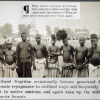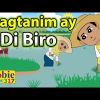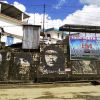The search found 45 results in 0.018 seconds.
Search results
In this photograph taken by American photographer Jessie Tarbox Beals (1870-1942), are eight Negrito young men at the 1904 World’s Fair in St. Louis with a statue of King Louis XIV in the background. As they are in an open field, this photograph could have been taken during the “Anthropology Day” games held by the fair committee to show off the indigenous Filipinos’ skills in various sports games to the public. In this case, the boys would have shown off their skills with a bow and arrow, whose straps can be seen over their shoulders.
Magtanim Ay ‘Di Biro or ‘Planting is not a joke’ is an old children’s song from the Philippines, often sung as a nursery school rhyme. While it is considered by many (including my own family growing up) as a traditional song, the origins of the rhyme are much more recent, as I found out after being inspired by another accession card discussing Surinamese children's rhymes.
Every mother tongue has sounds and sighs that utter laments and express hope. The word Ayaakho Ojala is derived from the Ao Indigenous tribal language and is the ultimate angst that is often invoked by women. It signifies a mother’s strength and comfort. As a woman utters it, she finds relief and rest from the pain of patriarchy that seeks to crush her down.
This song "Rise, Naga Woman" composed by Theyiesinuo Keditsu, music by Khyochano TCK and Topeni as soloist, was chosen as the winner for the ‘State Theme Song for Women’ and was released by the State Resource Centre for Women (SRCW) under the aegis of the Nagaland State Social Welfare Board (NSSWB) during a program organised to observe the International Day for the elimination of violence against women.
The song speaks to Naga women and asks them to spread their wings and rise up against discrimination and inspire all of Nagaland and take them to a glorious future.
In urban and suburban Nagaland, as in many of the conflict-affected regions of India's North-East, such signs calling into action people and collectives are commonly visible. In this poster, the church as site of popular resistance is agency for mobilisation of constituencies such as the youth towards a unified struggle for the Naga nation.
Pages






